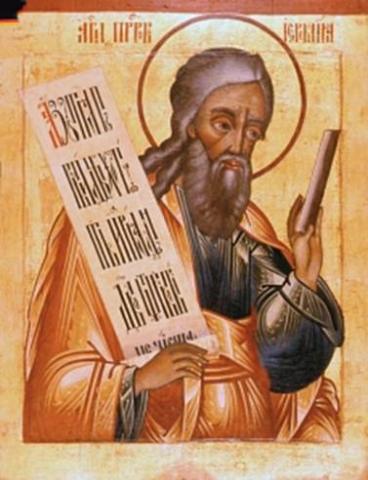Jeremiah
JEREMIAH
Possible Lesson Plan:
- Open with prayer.
- Scripture Reference: Jeremiah 1, 13, 18, 20, 26, 38-39. A long and arduous book – difficult to pick out the “highlights”. Have one student read each assigned chapter and write it up in news format, presenting it to the class as a newscaster.
- History: Jeremiah was called after the fall of the northern kingdom, during the reign of the good king Josiah in Judah. Josiah took the throne at age 8 – the throne of a land already worshipping Assyrian gods and paying tribute to the king of Assyria, Ashurbanipal. With the advice of the high priest, Hilkiah, Josiah tore down the Assyrian gods and worship places throughout the land. Ashurbanipal died about this time, and Josiah was not punished for his insolence. Then, the book of the law was found and Josiah dedicated himself and his people to follow the Lord. But, with the death of Josiah, his reforms came to naught. His successors, Jehoahaz, Jehoiakim, and Jehoiachin, were all wicked. These, and the final king of Judah, Zedekiah, were the recipients of most of Jeremiah’s prophecy. But, did the kings listen to the words of the Lord? Instead, Jeremiah’s prophecies brought him ridicule and he was despised and finally imprisoned. Jeremiah, and his student Baruch, wrote down all that God had told him, but the king burned the scroll. They wrote the prophecies again for us to read. Jeremiah also wrote a letter, or epistle, and the book of Lamentations, lamenting the fate of Jerusalem at the hands of the Babylonians. During this time, the Babylonians sacked the temple and took captives; later they returned and leveled the city.
- Service references: The book of Jeremiah is read in several of the services but the references are a bit more obscure than Jonah or Isaiah. St. Andrew of Crete, in his canon read during the first week of Great Lent, uses Jeremiah directly as an example: “Thrown into a well, Jeremiah lamented bitterly the fall of Zion. Only by such a life of mourning and weeping, O my soul, will you find the way to salvation.” But, some of the historical references from the time of Jeremiah are quite interesting. Jeremiah lived through the fall of Jerusalem to Babylon; on Christmas we read, “The daughter of Babylon once led captive from Zion the children of David, whom she had taken with the sword: but now she sends her own children, the Magi bearing gifts, to entreat the Daughter of David in whom God came to dwell.” Who prefigured the Magi? And the prayer of Manasseh, King of Judah after Hezekiah and before Josiah in II Chronicles 33:12-13 is read during Great Lent and referred to in the prayers of Holy Unction and Confession. Why did Manasseh need to repent? What was the result of his repentance?
- Discussion: Jeremiah faced persecution throughout his career as a prophet. Persecution can be anything from someone giving you a dirty look to brutal murder. Who or what would you be willing to face persecution for? Poll the class for answers to these possible situations:Would you risk persecution for...
To protect a close friend? To turn down a drink?
To listen to certain music? To disagree with my peer group?
To abstain from sex? To stand up for what I believe?
To speak out on racial intolerance? To protect the rain forests?
Which are definitely worth facing persecution for and why? What in your life would you definitely fight to keep? What is the greatest rejection you ever faced in a relationship? What is the worst persecution you have ever faced at school? Can you remember a moment when you stood up for God? Is there a time when you should have stood up and be counted for your beliefs and didn’t? Why? What qualities do you see in Jeremiah you would like to have?
At many times in history (name some?) and in many countries even today (name some?) Christians are still persecuted, even to the point of imprisonment or martyrdom. Can faith be strengthened by persecution? Would you rather live in a time of heavy persecution? Why or why not?
- Close with prayer: Draw a cross on the board. Agree together to risk facing persecution for the Lord. Have each student sign the cross with a red marker.
